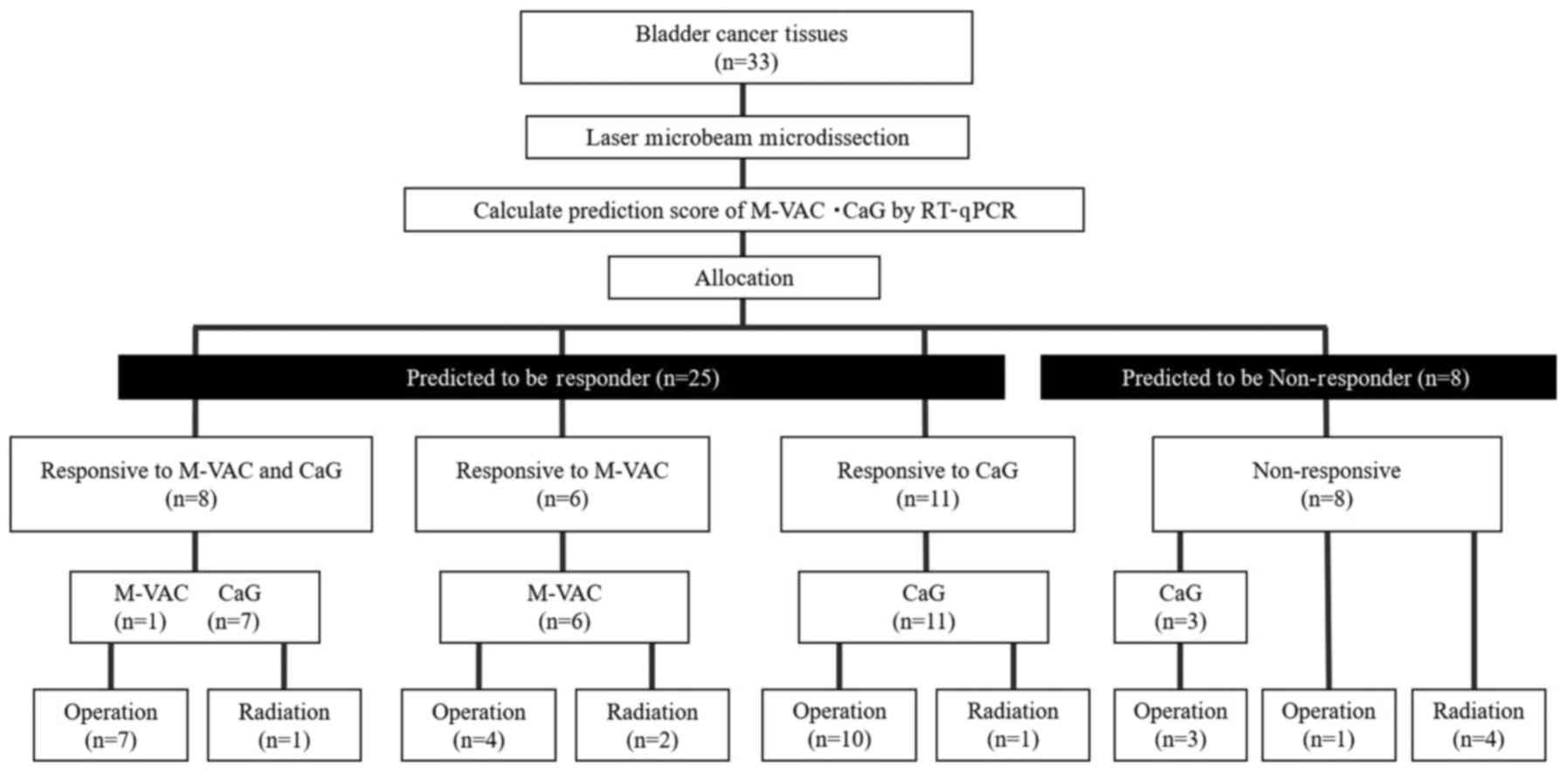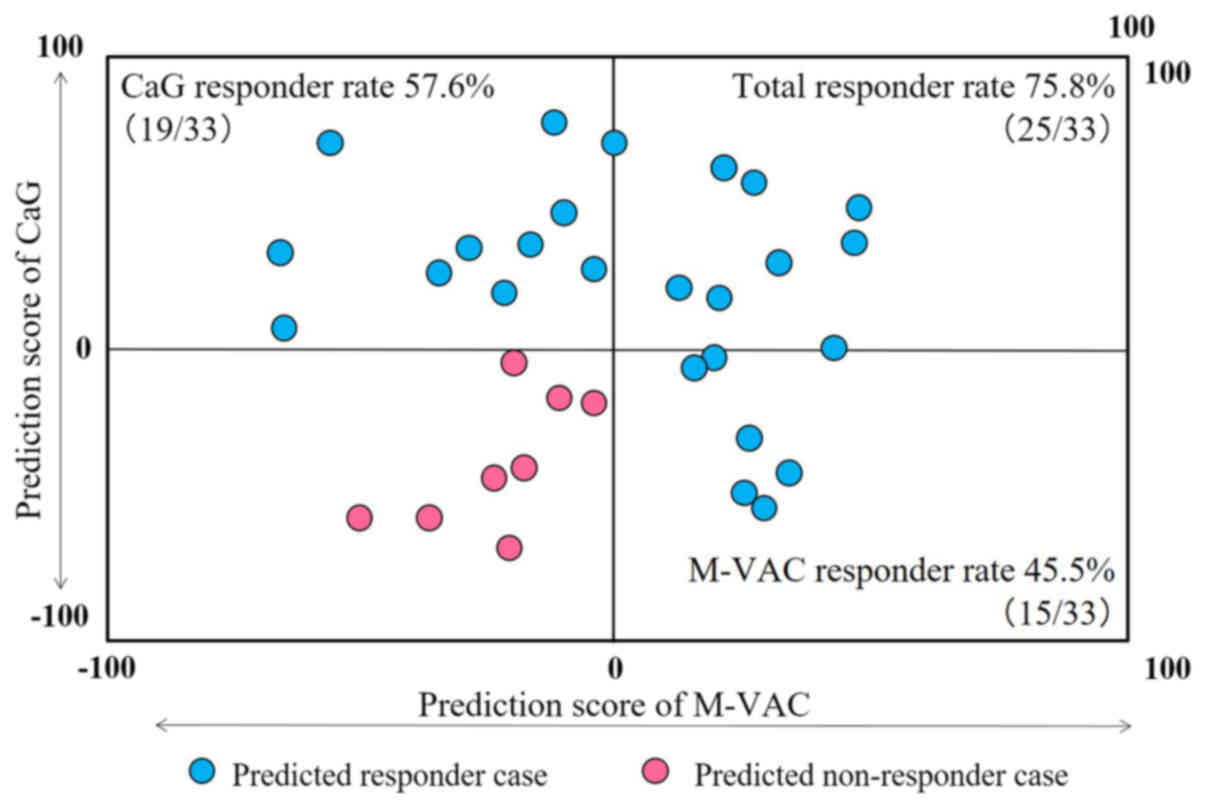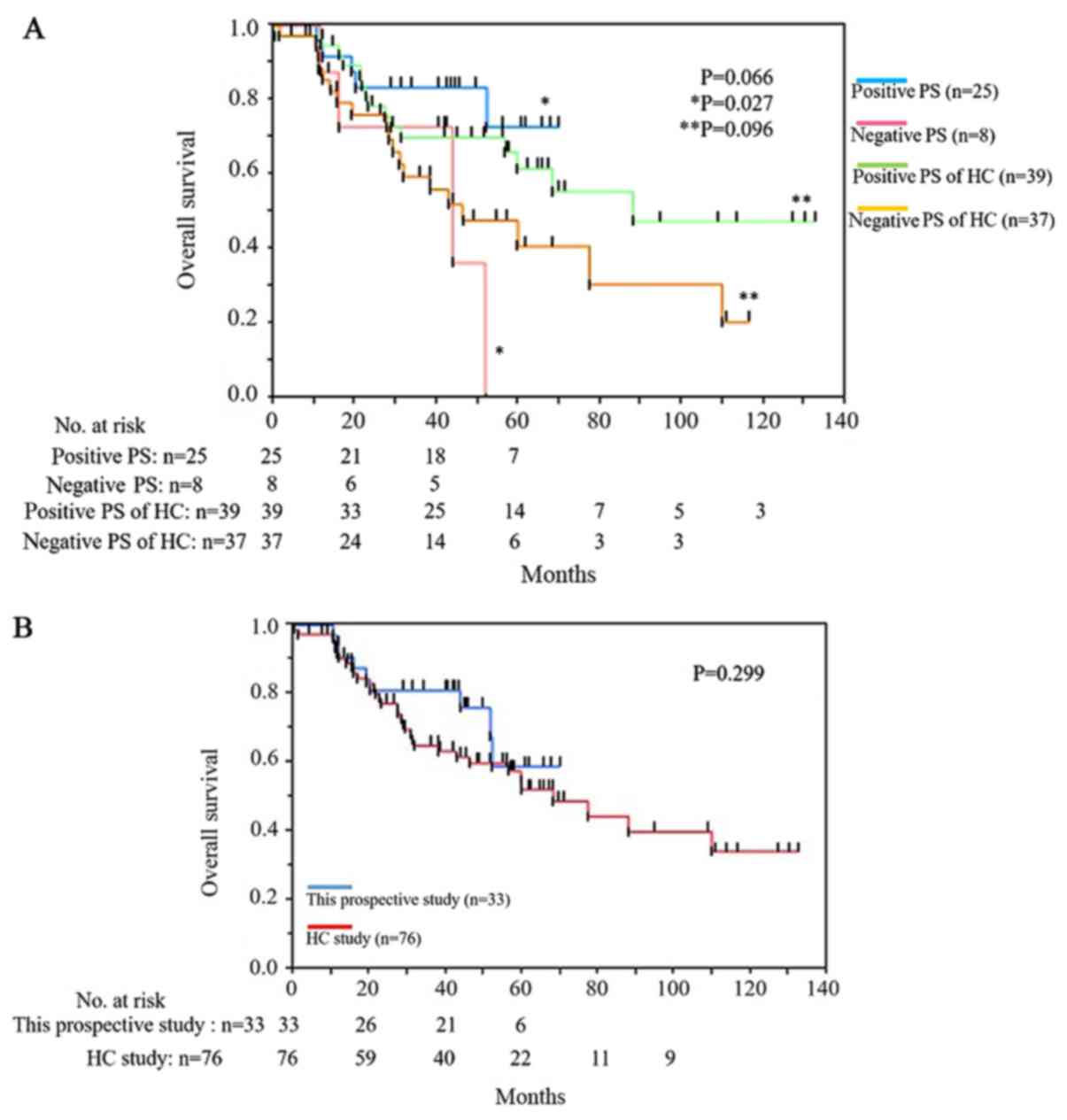|
1
|
Abdollah F, Gandaglia G, Thuret R,
Schmitges J, Tian Z, Jeldres C, Passoni NM, Briganti A, Shariat SF,
Perrotte P, et al: Incidence, survival and mortality rates of
stage-specific bladder cancer in United States: A trend analysis.
Cancer Epidemiol. 37:219–225. 2013. View Article : Google Scholar : PubMed/NCBI
|
|
2
|
Takata R, Katagiri T, Kanehira M, Tsunoda
T, Shuin T, Miki T, Namiki M, Kohri K, Matsushita Y, Fujioka T and
Nakamura Y: Predicting response to methotrexate, vinblastine,
doxorubicin, and cisplatin neoadjuvant chemotherapy for bladder
cancers through genome-wide gene expression profiling. Clin Cancer
Res. 11:2625–2636. 2005. View Article : Google Scholar : PubMed/NCBI
|
|
3
|
Kato Y, Zembutsu H, Takata R, Miya F,
Tsunoda T, Obara W, Fujioka T and Nakamura Y: Predicting response
of bladder cancers to gemcitabine and carboplatin neoadjuvant
chemotherapy through genome-wide gene expression profiling. Exp
Ther Med. 2:47–56. 2011. View Article : Google Scholar : PubMed/NCBI
|
|
4
|
Takata R, Katagiri T, Kanehira M, Shuin T,
Miki T, Namiki M, Kohri K, Tsunoda T, Fujioka T and Nakamura Y:
Validation study of the prediction system for clinical response of
M-VAC neoadjuvant chemotherapy. Cancer Sci. 98:113–117. 2007.
View Article : Google Scholar : PubMed/NCBI
|
|
5
|
Kitahara O, Furukawa Y, Tanaka T, Kihara
C, Ono K, Yanagawa R, Nita ME, Takagi T, Nakamura Y and Tsunoda T:
Alterations of gene expression during colorectal carcinogenesis
revealed by cDNA microarrays after laser-capture microdissection of
tumor tissues and normal epithelia. Cancer Res. 61:3544–3549.
2011.
|
|
6
|
Okabe H, Satoh S, Kato T, Kitahara O,
Yanagawa R, Yamaoka Y, Tsunoda T, Furukawa Y and Nakamura Y:
Genome-wide analysis of gene expression in human hepatocellular
carcinomas using cDNA microarray: Identification of genes involved
in viral carcinogenesis and tumor progression. Cancer Res.
61:2129–2137. 2001.PubMed/NCBI
|
|
7
|
Yamanaka Y, Tamari M, Nakahata T and
Nakamura Y: Gene expression profiles of human small airway
epithelial cells treated with low doses of 14- and 16-membered
macrolides. Biochem Biophys Res Commun. 287:198–203. 2001.
View Article : Google Scholar : PubMed/NCBI
|
|
8
|
Livak KJ and Schmittgen TD: Analysis of
relative gene expression data using real-time quantitative PCR and
the 2(-Delta Delta C(T)) method. Methods. 25:402–408. 2001.
View Article : Google Scholar : PubMed/NCBI
|
|
9
|
Golub TR, Slonim DK, Tamayo P, Huard C,
Gaasenbeek M, Mesirov JP, Coller H, Loh ML, Downing JR, Caligiuri
MA, et al: Molecular classification of cancer: Class discovery and
class prediction by gene expression monitoring. Science.
286:531–537. 1999. View Article : Google Scholar : PubMed/NCBI
|
|
10
|
Karadimou A, Lianos E, Pectasides D,
Dimopoulos MA and Bamias A: Efficacy of
methotrexate/vinblastine/doxorubicin cisplatin combination in
gemcitabine-pretreated patients with advanced urothelial cancer: A
retrospective analysis. Open Access J Urol. 2:193–119.
2010.PubMed/NCBI
|
|
11
|
Han KS, Joung JY, Kim TS, Jeong IG, Seo
HK, Chung J and Lee KH: Methotrexate, vinblastine, doxorubicin and
cisplatin combination regimen as salvage chemotherapy for patients
with advanced or metastatic transitional cell carcinoma after
failure of gemcitabine and cisplatin chemotherapy. Br J Cancer.
98:86–90. 2008. View Article : Google Scholar : PubMed/NCBI
|
|
12
|
Edeline J, Loriot Y, Culine S, Massard C,
Albiges L, Blesius A, Escudier B and Fizazi K: Accelerated MVAC
chemotherapy in patients with advanced bladder cancer previously
treated with a platinum-gemcitabine regimen. Eur J Cancer.
48:1141–1146. 2012. View Article : Google Scholar : PubMed/NCBI
|
|
13
|
Hoshi S, Ohyama C, Ono K, Takeda A,
Yamashita S, Yamato T, Itoh A, Satoh M, Saito S, Okada Y, et al:
Gemcitabine plus carboplatin; and gemcitabine, docetaxel, and
carboplatin combined chemotherapy regimens in patients with
metastatic urothelial carcinoma previously treated with a
platinum-based regimen: preliminary report. Int J Clin Oncol.
9:125–129. 2004. View Article : Google Scholar : PubMed/NCBI
|
|
14
|
Sarkis AS, Bajorin DF, Reuter VE, Herr HW,
Netto G, Zhang ZF, Schultz PK, Cordon-Cardo C and Scher HI:
Prognostic value of p53 nuclear overexpression in patients with
invasive bladder cancer treated with neoadjuvant MVAC. J Clin
Oncol. 13:1384–1390. 1995. View Article : Google Scholar : PubMed/NCBI
|
|
15
|
Riester M, Werner L, Bellmunt J,
Selvarajah S, Guancial EA, Weir BA, Stack EC, Park RS, O'Brien R,
Schutz FA, et al: Integrative analysis of 1q23.3 copy-number gain
in metastatic urothelial carcinoma. Clin Cancer Res. 20:1873–1883.
2014. View Article : Google Scholar : PubMed/NCBI
|
|
16
|
von der Maase H, Sengelov L, Roberts JT,
Ricci S, Dogliotti L, Oliver T, Moore MJ, Zimmermann A and Arning
M: Long-term survival results of a randomized trial comparing
gemcitabine plus cisplatin, with methotrexate, vinblastine,
doxorubicin, plus cisplatin in patients with bladder cancer. J Clin
Oncol. 23:4602–4608. 2005. View Article : Google Scholar : PubMed/NCBI
|
|
17
|
Galsky MD, Pal SK, Chowdhury S, Harshman
LC, Crabb SJ, Wong YN, Yu EY, Powles T, Moshier EL, Ladoire S, et
al: Comparative effectiveness of gemcitabine plus cisplatin versus
methotrexate, vinblastine, doxorubicin, plus cisplatin as
neoadjuvant therapy for muscle-invasive bladder cancer. Cancer.
121:2586–2593. 2015. View Article : Google Scholar : PubMed/NCBI
|
|
18
|
Yeshchina O, Badalato GM, Wosnitzer MS,
Hruby G, Roy Choudhury A, Benson MC, Petrylak DP and McKiernan JM:
Relative efficacy of perioperative gemcitabine and cisplatin versus
methotrexate, vinblastine, adriamycin, and cisplatin in the
management of locally advanced urothelial carcinoma of the bladder.
Urology. 79:384–390. 2012. View Article : Google Scholar : PubMed/NCBI
|
|
19
|
Zargar H, Espiritu PN, Fairey AS, Mertens
LS, Dinney CP, Mir MC, Krabbe LM, Cookson MS, Jacobsen NE, Gandhi
NM, et al: Multicenter assessment of neoadjuvant chemotherapy for
muscle-invasive bladder cancer. Eur Urol. 67:241–249. 2015.
View Article : Google Scholar : PubMed/NCBI
|
|
20
|
Dash A, Pettus JA IV, Herr HW, Bochner BH,
Dalbagni G, Donat SM, Russo P, Boyle MG, Milowsky MI and Bajorin
DF: A role for neoadjuvant gemcitabine plus cisplatin in
muscle-invasive urothelial carcinoma of the bladder: A
retrospective experience. Cancer. 113:2471–2477. 2008. View Article : Google Scholar : PubMed/NCBI
|
|
21
|
Dogliotti L, Cartenì G, Siena S, Bertetto
O, Martoni A, Bono A, Amadori D, Onat H and Marini L: Gemcitabine
plus cisplatin versus gemcitabine plus carboplatin as first-line
chemotherapy in advanced transitional cell carcinoma of the
urothelium: Results of a randomized phase 2 trial. Eur Urol.
52:134–141. 2007. View Article : Google Scholar : PubMed/NCBI
|
|
22
|
Mertens LS, Meijer RP, Kerst JM, Bergman
AM, van Tinteren H, van Rhijn BW and Horenblas S: Carboplatin based
induction chemotherapy for nonorgan confined bladder cancer-a
reasonable alternative for cisplatin unfit patients? J Urol.
188:1108–1113. 2012. View Article : Google Scholar : PubMed/NCBI
|
|
23
|
Iwasaki K, Obara W, Kato Y, Takata R,
Tanji S and Fujioka T: Neoadjuvant gemcitabine plus carboplatin for
locally advanced bladder cancer. Jpn J Clin Oncol. 43:193–199.
2013. View Article : Google Scholar : PubMed/NCBI
|
|
24
|
Grossman HB, Natale RB, Tangen CM,
Speights VO, Vogelzang NJ, Trump DL, deVere White RW, Sarosdy MF,
Wood DP Jr, Raghavan D and Crawford ED: Neoadjuvant chemotherapy
plus cystectomy compared with cystectomy alone for locally advanced
bladder cancer. N Engl J Med. 349:859–866. 2003. View Article : Google Scholar : PubMed/NCBI
|
|
25
|
Meyer A, Ghandour R, Bergman A, Castaneda
C, Wosnitzer M, Hruby G, Benson M and McKiernan J: The natural
history of clinically complete responders to neoadjuvant
chemotherapy for urothelial carcinoma of the bladder. J Urol.
192:696–701. 2014. View Article : Google Scholar : PubMed/NCBI
|
|
26
|
Petrelli F, Coinu A, Cabiddu M, Ghilardi
M, Vavassori I and Barni S: Correlation of pathologic complete
response with survival after neoadjuvant chemotherapy in bladder
cancer treated with cystectomy: A meta-analysis. Eur Urol.
65:350–357. 2014. View Article : Google Scholar : PubMed/NCBI
|
|
27
|
Scattoni V, Bolognesi A, Cozzarini C,
Francesca F, Grasso M, Galli L, Torelli T, Campo B, Villa E and
Rigatti P: Neoadjuvant CMV chemotherapy plus radical cystectomy in
locally advanced bladder cancer: The impact of pathologic response
on long-term results. Tumori. 82:463–469. 1996. View Article : Google Scholar : PubMed/NCBI
|
|
28
|
Kitamura H, Tsukamoto T, Shibata T,
Masumori N, Fujimoto H, Hirao Y, Fujimoto K, Kitamura Y, Tomita Y,
Tobisu K, et al: Randomised phase III study of neoadjuvant
chemotherapy with methotrexate, doxorubicin, vinblastine and
cisplatin followed by radical cystectomy compared with radical
cystectomy alone for muscle-invasive bladder cancer: Japan clinical
oncology group study JCOG0209. Ann Oncol. 25:1192–1198. 2014.
View Article : Google Scholar : PubMed/NCBI
|

















